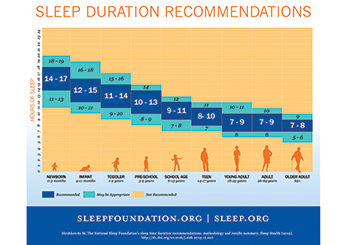How much sleep should you get? Experts expand recommendations

Photo: National Sleep Foundation
Washington – Do you know how much sleep someone your age needs? The National Sleep Foundation has widened its recommended sleep ranges for most age groups.
The foundation also created two new age categories – younger adults and older adults – and narrowed the recommended sleep range for newborns.
The recommendations are based on consensus voting by experts in various subjects such as sleep, pediatrics and neurology. The updated ranges:
- Newborns (ages 0-3 months): 14-17 hours daily (previously 12-18)
- Infants (4-11 months): 12-15 hours (previously 14-15)
- Toddlers (1-2 years): 11-14 hours (previously 12-14)
- Preschoolers (3-5): 10-13 hours (previously 11-13)
- School-age children (6-13): 9-11 hours (previously 10-11)
- Teens (14-17): 8-10 hours (previously 8.5-9.5)
- Younger adults (18-25): 7-9 hours
- Adults (26-64): 7-9 hours (did not change)
- Older adults (65 and older): 7-8 hours
NSF also provides “recommended,” “may be appropriate” and “not recommended” sleep ranges for each age group. The “may be appropriate” sleep ranges are about one to two hours broader than the recommended ranges to take into account that some individuals get by on different amounts of sleep.
“The National Sleep Foundation Sleep Duration Recommendations will help individuals make sleep schedules that are within a healthy range. They also serve as a useful starting point for individuals to discuss their sleep with their health care providers,” David Cloud, NSF CEO, said in a press release.
The new recommendations were published in the December issue of Sleep Health.
Post a comment to this article
Safety+Health welcomes comments that promote respectful dialogue. Please stay on topic. Comments that contain personal attacks, profanity or abusive language – or those aggressively promoting products or services – will be removed. We reserve the right to determine which comments violate our comment policy. (Anonymous comments are welcome; merely skip the “name” field in the comment box. An email address is required but will not be included with your comment.)

